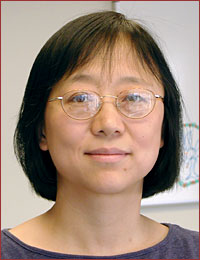|
Junying Yuan, Ph.D.
--------------------------------------------------------------------------------
-------------------------------------------------------------------------------- Caspase-11 is an upstream caspase which we have shown previously required for activation of caspase-1 and pro-IL-1ß processing. While the expression of caspase-11 is undetectable in most tissues of healthy mice, it can be induced by a variety of pathological signals. Caspase-11-deficient mice showed a defect in processing pro-IL-1ß as well as reduced number of apoptotic cells and a defect in caspase-3 activation. We concluded that caspase-11 is an upstream caspase in mediating cytokine secretion as well as apoptosis under brain ischemia and systemic inflammation. Unfolded protein response in endoplasmic reticulum has been implicated in mediating neuronal cell death in Alzheimer's disease. We found that caspase-12 is localized in ER and a deficiency in caspase-12 renders cortical neurons specifically resistant to amyloid ß protein toxicity. Our work demonstrated a novel ER-specific apoptosis pathway. Chemical genetic approaches to dissect the mechanism of Bcl-2. Heterodimerization of pro- and anti-apoptotic members of the Bcl-2 family through their BH3 domains is critical for regulating cell survival. To further characterize the role of BH3 domain interaction and develop prototypic small molecule inhibitors of Bcl-2 family, we developed a high throughput screen for Bcl-2 inhibitors. We isolated two series of Bcl-2 inhibitors and demonstrated by in vivo and in vitro experiments that they induce apoptosis through inhibiting BH3 domain interaction. Similar chemical genetic approaches are being used in the laboratory to dissect other pathways involved in regulating physiological and pathological cell death.
-------------------------------------------------------------------------------- (1) Miura M, Zhu H, Hartwieg EA, Rotello R, Yuan J. Induction of apoptosis in fibroblasts by interleukin-1ß converting enzyme, a mammalian homolog of C. elegans cell death gene ced-3. Cell 1993; 75: 653-660 (2) Gagliardini V, Fernandez PA, Lee RKK, Drexler HCA, Rotello R, Fishman M, Yuan J. Prevention of vertebrate neuronal death by the crmA gene. Science 1994; 263: 826-828. (3) Wang L, Miura M, Bergeron L, Zhu H, Yuan J. Ich-1, an Ice/Ced-3 related gene, encodes both positive and negative regulators of programmed cell death. Cell 1994; 78:739-750. (5) Friedlander RM, Gagliardini V, Wang J, Brown RH, Yuan J. Inhibition of ICE slows ALS in mice. Nature. 1997; 388: 31. (7) Wang S, Miura M, Jung Y-K, Zhu H, Li E, Yuan J. Murine caspase-11, an ICE interacting protease, is essential for the activation of ICE. Cell. 1998; 92:501-509. (8) Bergeron L, Perez GI, MacDonald G, Shi L, Sun Y, Jurisicova| A, Varmuza S, Latham KE, Flaws JA, Salter J, Hara H, Moskowitz MA, Li E, Greenberg A, Tilly JL, Yuan J. Defects in regulation of apoptosis in caspase-2-deficient mice. Genes & Dev. 1998; 12:1304-1314. (9) Namura S, Zhu J, Fink K, Endres M, Srinivasan A, Tomaselli KJ, Yuan J, Moskowitz MA. Activation and cleavage of caspase-3 in apoptosis induced by experimental cerebral ischemia. J. Neurosci. 1998; 18: 3659-3668 (10) Li H, Zhu H, Xu C-J, and Yuan J. Cleavage of BID by caspase 8 mediates the mitochondrial damage in the Fas pathway of apoptosis. Cell. 1998; 94: 491-501. (11) Chou JJ, Li H, Salveson G, Yuan J and Wagner G. Solution structure of Bid, an intracellular amplifier of apoptosis. Cell. 1999; 96:615-624. (12)Sánchez I, Xu CJ, Juo P, Kakizaka A, Blenis J, and Yuan J. Caspase-8 is Required for Cell Death Induced by Expanded Polyglutamine Repeats. Neuron. 1999; 22: 623-633. (13) Nakagawa T, Zhu H, Morishima N, Li E, Xu J, Yankner BA and Yuan J. Caspase-12 mediates endoplasmic-reticulum-specific apoptosis and cytotoxicity by amyloid ß;. Nature. 2000. 403, 98-103. (14) Kang, S-J., Wang, S., Hara, H., Peterson, E. P., Srinivasan, A., Namura, S., Amin-Hanjani, S., Tomaselli, K. J., Thornberry, N. J., Moskowitz, M. A., and Yuan, J. Dual role of caspase-11 in mediating activation of caspase-1 and caspase-3 under pathological conditions. J. Cell Biol. 2000. 149, 613-622. (15) Nakagawa T and Yuan J. Cross-talk between two cysteine protease families: activation of caspase-12 by calpain in apoptosis. J. Cell Biol. 2000. 150(4):887-894. (16) Degterev A, Lugovskoy, Cardone M, Mulley B, Wagner G, Mitchison T and Yuan J. Identification of small molecular inhibitors of BH3 and Bcl-xL interaction. Nature Cell Biol. 2001. 3,173-182.
-------------------------------------------------------------------------------- (责任编辑:泉水) |
Junying Yuan(袁钧英)博士简介
时间:2012-11-16 19:28来源:生物谷 作者:bioguider 点击:
1318次
顶一下
(9)
100%
踩一下
(0)
0%
------分隔线----------------------------
- 上一篇:袁钧英---细胞死亡新途径
- 下一篇:美国科学家发现:"跳跃基因"决定你的大脑特性
- 发表评论
-
- 最新评论 进入详细评论页>>
- 推荐内容
-
- 体生长抑素信号在大脑中的作用
作者:宾夕法尼亚州立大学 Sam Sholtis 新研究表明,由大脑中许多...
- 协和发现国内首例“阴性艾滋病患
HIV抗体检测为常见的艾滋病筛查手段,阳性一般意味着感染,阴...
- 研究发现:月圆之周自杀死亡人数
作者:印第安纳大学医学院 图片来源:Pixabay/CC0 公共领域 几个...
- 大脑图像的清晰度提高了 6400 万倍
杜克大学 超级强大的核磁共振成像与光片显微镜相结合,使研究...
- 研究发现:保持免疫复原力的人更
作者:德克萨斯大学圣安东尼奥健康科学中心 Sunil Ahuja、Muthu ...
- 大脑如何检测和调节炎症
牛奶经过微生物发酵成为酸奶以后,其中的营养成分和营养价值...
- 体生长抑素信号在大脑中的作用

